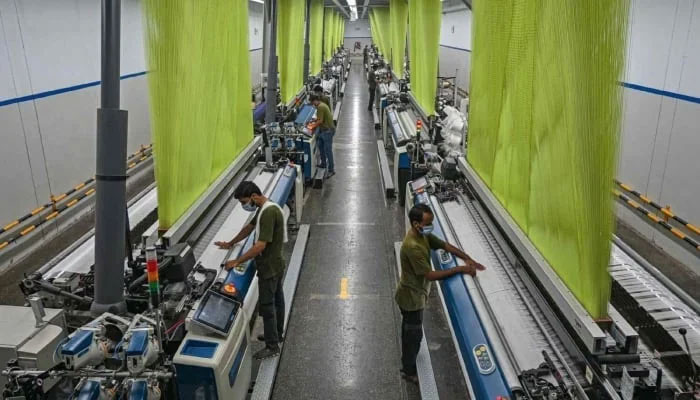Key to success
LAHORE: In recent years, competitive advantage has increasingly shifted to include the speed of production and delivery. Companies with the same input costs but longer delivery times often lose to competitors who can deliver goods more quickly.
Globalisation has intensified competition, making time-to-market critical. Advances in production and logistics technologies have enabled faster cycles, while customers now expect rapid delivery and frequent product updates.
Many export-oriented textile manufacturers in Pakistan have adopted lean manufacturing, automation and integrated supply chain systems to reduce product development and delivery times. However, outside the textile sector, the adoption of shortened development cycles remains limited, although it is gradually gaining traction in certain industries.
In addition to textiles, export-focused IT firms and startups catering to international markets have embraced these practices to meet client demands for shorter time-to-market. Several tech companies here have integrated rapid development cycles into their operations. In the IT sector, many Pakistani software and tech companies have adopted Agile and Scrum methodologies to accelerate product development, contributing to the rapid growth of IT exports.
In the fast-moving consumer goods (FMCG) sector, local companies have streamlined product development processes to quickly launch new products and respond to changing consumer preferences. Similarly, some automobile assemblers, especially those working with international brands, have adopted lean manufacturing and just-in-time (JIT) methods to enhance production cycles.
Leading pharmaceutical companies in Pakistan have invested in research and development to expedite the introduction of generic drugs while meeting international quality standards. E-commerce platforms along with brands with online operations have adopted agile strategies to quickly develop and deploy new features or adapt supply chains based on consumer trends.
However, industries like construction remain traditional, with limited adoption of methods to significantly shorten project timelines. In agriculture, biological constraints naturally lengthen development cycles, and the sector has yet to fully embrace technologies such as precision farming or automated supply chains to improve timelines.
Globally, Japan is credited with pioneering methods to reduce product development cycles and factory process times. This effort began in the mid-20th century with the introduction of concepts like JIT, a production strategy that minimises inventory and lead times. Other influential practices include lean manufacturing, a systematic approach to eliminating waste, and Kaizen, which emphasises continuous improvement to enhance efficiency.
Pakistan’s textile export-oriented units work closely with international buyers who demand faster turnaround times for seasonal and trend-based apparel. Influenced by fast fashion brands, these manufacturers have optimised processes to meet tight deadlines.
The use of computer-aided design (CAD) and digital textile printing has significantly reduced the time required to develop and prototype new designs. Many manufacturers have implemented enterprise resource planning (ERP) systems to streamline operations and enable real-time decision-making.
Leading textile firms have adopted advanced systems to meet the stringent delivery schedules of international brands. Several other companies leverage technology and process improvements to remain competitive in global markets.
Despite progress, several challenges hinder the widespread adoption of shortened production cycles. Small- and medium-sized textile units often rely on outdated machinery and manual processes. Frequent power outages and inadequate logistics infrastructure also delay production. Additionally, SMEs struggle with limited access to affordable financing for modernising equipment and face a shortage of trained personnel in automation and digital technologies.
-
 Benny Blanco Addresses ‘dirty Feet’ Backlash After Podcast Moment Sparks Online Frenzy
Benny Blanco Addresses ‘dirty Feet’ Backlash After Podcast Moment Sparks Online Frenzy -
 Sarah Ferguson Unusual Trait That Confused Royal Expert
Sarah Ferguson Unusual Trait That Confused Royal Expert -
 Prince William, Kate Middleton Left Sarah Ferguson Feeling 'worthless'
Prince William, Kate Middleton Left Sarah Ferguson Feeling 'worthless' -
 Ben Affleck Focused On 'real Prize,' Stability After Jennifer Garner Speaks About Co Parenting Mechanics
Ben Affleck Focused On 'real Prize,' Stability After Jennifer Garner Speaks About Co Parenting Mechanics -
 Luke Grimes Reveals Hilarious Reason His Baby Can't Stop Laughing At Him
Luke Grimes Reveals Hilarious Reason His Baby Can't Stop Laughing At Him -
 Why Kate Middleton, Prince William Opt For ‘show Stopping Style’
Why Kate Middleton, Prince William Opt For ‘show Stopping Style’ -
 Here's Why Leonardo DiCaprio Will Not Attend This Year's 'Actors Award' Despite Major Nomination
Here's Why Leonardo DiCaprio Will Not Attend This Year's 'Actors Award' Despite Major Nomination -
 Ethan Hawke Reflects On Hollywood Success As Fifth Oscar Nomination Arrives
Ethan Hawke Reflects On Hollywood Success As Fifth Oscar Nomination Arrives -
 Tom Cruise Feeling Down In The Dumps Post A Series Of Failed Romances: Report
Tom Cruise Feeling Down In The Dumps Post A Series Of Failed Romances: Report -
 'The Pitt' Producer Reveals Why He Was Nervous For The New Ep Of Season Two
'The Pitt' Producer Reveals Why He Was Nervous For The New Ep Of Season Two -
 Maggie Gyllenhaal Gets Honest About Being Jealous Of Jake Gyllenhaal
Maggie Gyllenhaal Gets Honest About Being Jealous Of Jake Gyllenhaal -
 'Bridgerton' Star Luke Thompson Gets Honest About Season Five
'Bridgerton' Star Luke Thompson Gets Honest About Season Five -
 Prince William On Verge Of Breakdown Because Of 'disgraced' Andrew
Prince William On Verge Of Breakdown Because Of 'disgraced' Andrew -
 Tig Notaro Reflects On Oscar Nod For 'Come See Me In The Good Light': 'I Was Sleeping'
Tig Notaro Reflects On Oscar Nod For 'Come See Me In The Good Light': 'I Was Sleeping' -
 Kenyon Sadiq Sets 40-yard Dash Record At NFL Scouting Combine, Eyes First Round
Kenyon Sadiq Sets 40-yard Dash Record At NFL Scouting Combine, Eyes First Round -
 Talk Show Host Drops Hint About Taylor Swift, Travis Kelce Wedding Date
Talk Show Host Drops Hint About Taylor Swift, Travis Kelce Wedding Date




